By Bram Peters
The future of food systems is uncertain, yet one thing is clear—transformative change is urgently needed. Climate change, inequality, and geopolitical instability are reshaping how food is produced, distributed, and consumed. How can we navigate these complexities and create a more sustainable, resilient food system?
At the Power of Foresight Workshop held on 30-31 January 2025 at the FAO headquarters in Rome, experts and practitioners gathered to discuss how foresight can drive food systems transformation. Their insights reveal a crucial truth: the process itself— working with complexity, embracing inclusivity, diverse perspectives, and collective intelligence—is central to making real progress.
Insights from the ‘Power of Foresight’ Workshop
- 17 different cases and the stories of 48 participants from 27 countries demonstrated that foresight approaches have much to offer to the process of food systems transformation
- Working with complex systems is what it’s about, and effective foresight practices for food systems change to embrace this
- Openness to new and inclusive perspectives should be central to all foresight for food systems transformation efforts
- The process brings the answer – and foresight can bring awareness of crucial process elements such as collective intelligence, agency, time and scale
- Embracing the ‘ifs’: how you do foresight, and what comes before and after, is just as important as the development of scenarios
- Foresight is not one approach or one methodology – there are a diversity of ways to go about it
- The national food systems pathways can benefit from foresight approaches
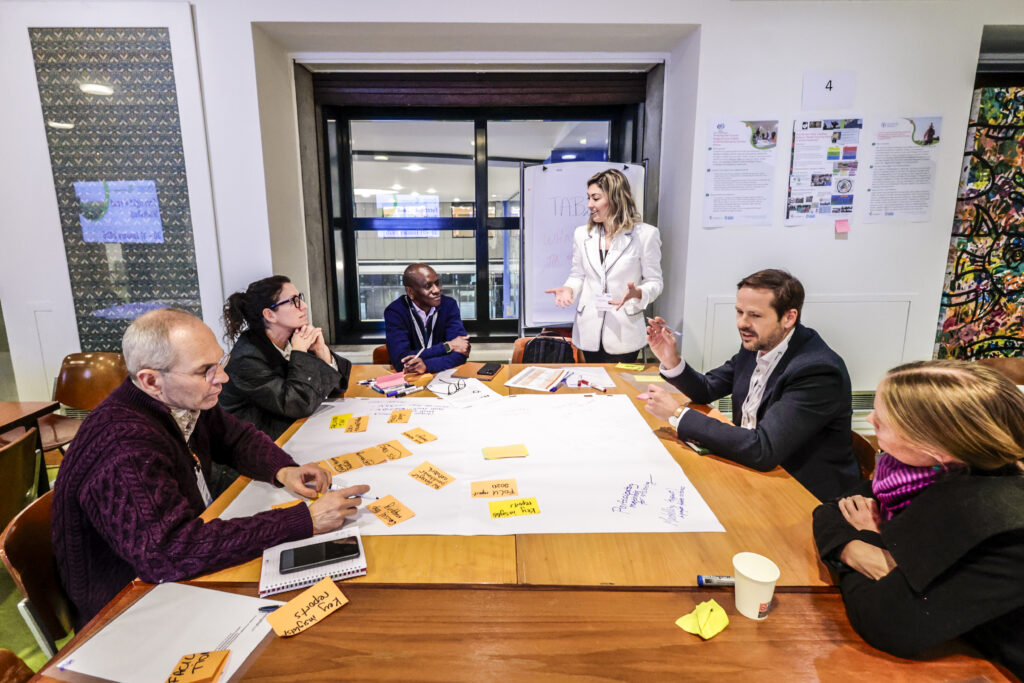
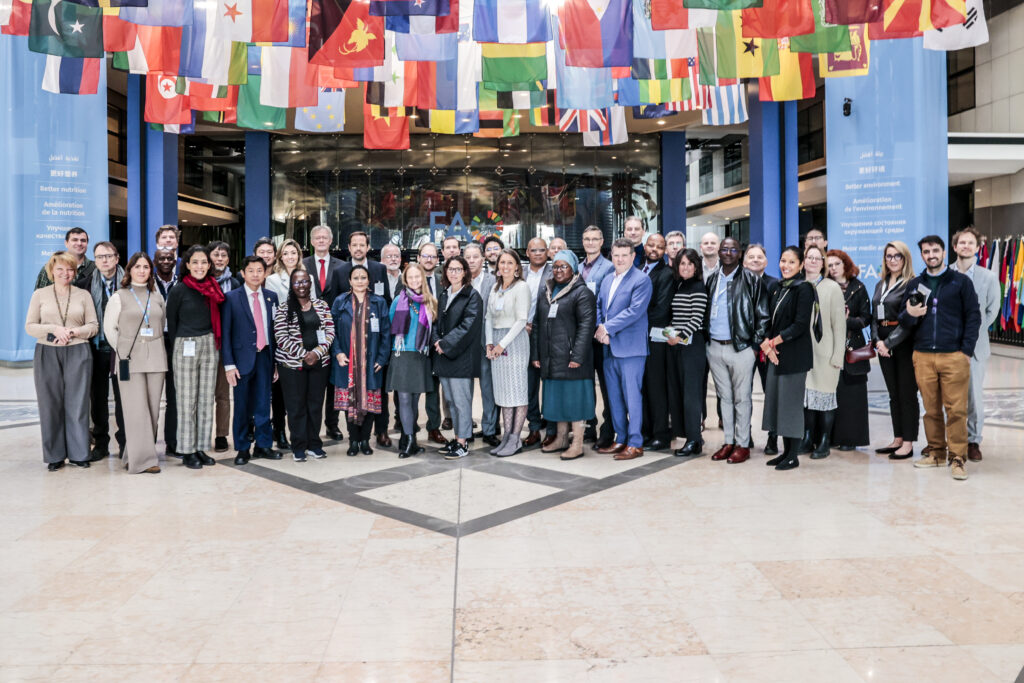
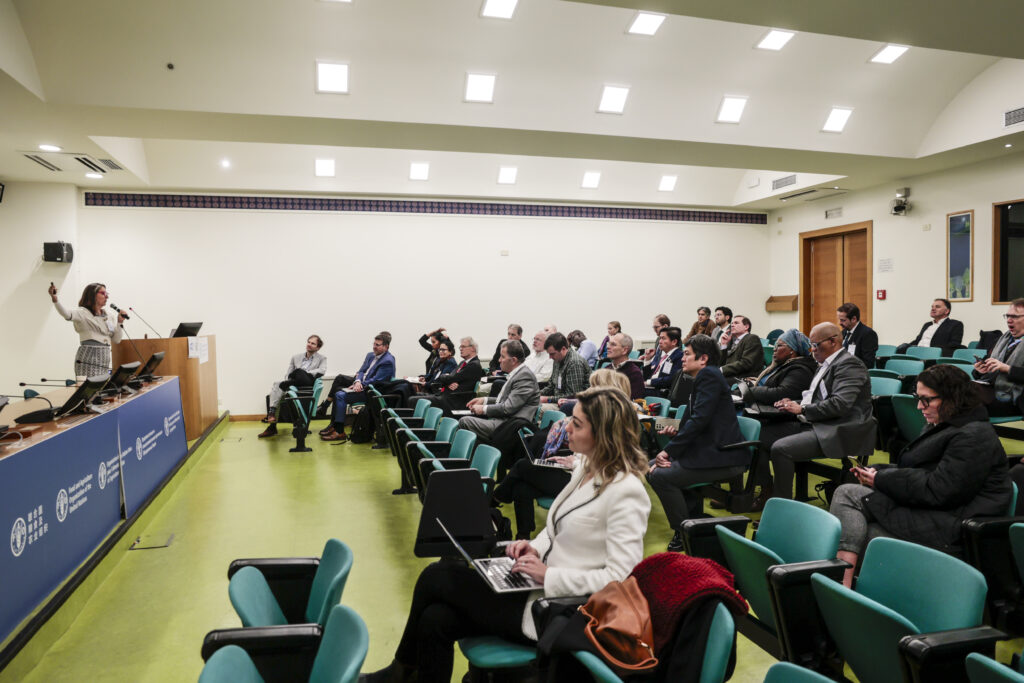
Photos: 30 January 2025, Foresight4Food workshop. FAO Headquarters, Rome. Photo credit: ©️FAO/Cristiano Minichiello
Working with complex systems: Let’s talk about the elephants in the room
When it comes to food systems transformation, there isn’t just one elephant in the room—there are many. These metaphorical elephants represent the complex, interconnected challenges we face, and ignoring them only hinders progress.
- First, as a whole range of interrelated challenges and assumptions we are not working on enough: whether that’s climate change, human rights, global geopolitical turbulence, growing inequality. All these challenges together form a context of global polycrisis.
- Second, we can see elephants in the room related to our apparent inability to take decisive transformative action in food systems: a lot of talk, limited action.
- Finally, we can see elephants as representing systems. An elephant can represent a dynamic, complex food system, of which we might only be able to see or understand the trunk, tusks, ears or tail.
Like the elephant and the blind men metaphor (see image to the right), food systems are deeply interconnected with global issues like climate change, inequality, and geopolitical instability. Tackling these requires a holistic approach, recognizing that transformation cannot happen in silos.
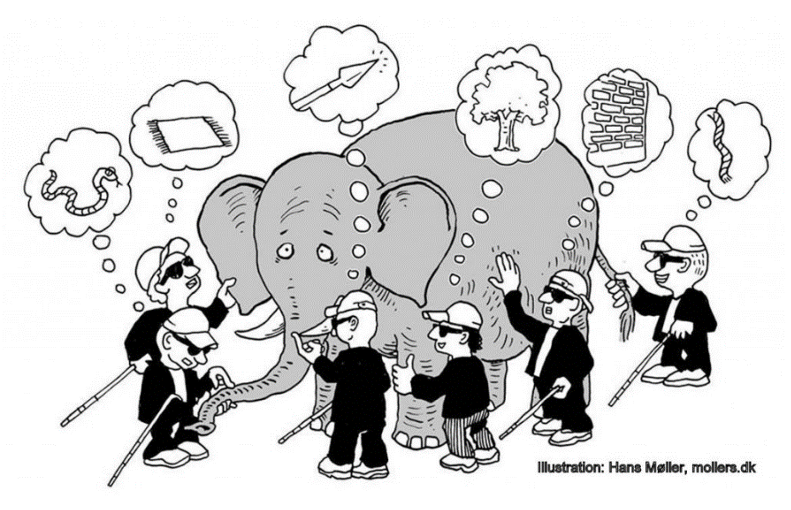
Gather new and inclusive perspectives – and change your own
What’s central to talking about complex food systems is perspective. We all have different mental images of food systems—whether local agriculture, marine ecosystems, or trade networks. Expanding our perspectives helps identify new entry points for addressing issues like malnutrition, poverty, and sustainability.

For some, like from the Pacific region, it’s about marine ecosystems in which food is central. Changing your perspective can be a helpful way of looking at a complex topic: such as to see the Pacific food system composed not of ‘small island states’ but rather ‘large ocean states’ connected with the global food system through trade, governance, and oceanic currents. Why is flipping your perspective so important? It helps to reframe entry points for discussion with other stakeholders and view the root causes of things like malnutrition, non-communicable diseases, poverty and human rights abuse in food systems differently.
If you are able to change your perspective, it helps to understand the viewpoints of those less heard. Having an inclusive process to gather different viewpoints is crucial to changing perspectives and behaviour, mobilising for collective action and creating shared visions of the future.
The process is the answer
Ever tried herding cats? Well, transforming food systems is about fostering C.A.T.S.—a process centred on:
- Collective intelligence – Multi-stakeholder collaboration and co-creation
- Agency – Empowering change through action
- Time – Bridging past, present, and future
- Scale – Recognizing interconnections between local and global systems
So, what does it mean to herd cats when talking about food systems? It means there are no magic bullets: the process is central to the outcome.
Effort on addressing the ‘ifs’
Foresight can be of great added value to support the food systems transformation process. Whether it is about co-creating alternative futures, conducting backcasting towards a more desirable scenario, highlighting the cost of delayed action, or informing anticipatory policy – foresight and scenario tools are a key toolbox in the hands of systems change champions.
In order for foresight to be effective, there are a number of conditional ‘ifs’ i.e., if foresight experts and facilitators:
- Are able to move beyond added value, tackling pre-conditions, obstacles, and constraints affecting how stakeholders prepare for the future.
- Not only preach to the converted – we need to involve stakeholders who think and act differently
- Are cognizant of power differences, lock-ins and political economy
- Build on other approaches that also provide value, such as design thinking, human-centred development and mission-oriented policy making.
- Pay attention to what comes before and after the development of scenarios
Scenarios only developed from the perspective of single organisations or without meaningful consultation and dialogue will not be effective.
Foresight approaches and national food systems pathways
There are a broad range of foresight approaches, some expert-driven or participatory, others quantitative, experiential, creative or analytical. Each has their value – but these needs come from a clear user need and scope within a food system. However, it is essential to keep in mind that foresight is a tool, not a panacea, and cannot address all questions.
With 156 national convenors driving progress through implementing 137 national food systems transformation pathways, the upcoming UNFSS+4 Stocktaking Moment (July, Addis Ababa) presents an opportunity to share lessons and strengthen impact. What we have seen the past two days in Rome, is the incredible richness and diversity of initiatives that use foresight to support the food systems transformation process.
Sharing the lessons from these initiatives, communicating the potential of foresight, and supporting the national convenors to further realise the impact on transforming food systems outcomes will be crucial in the run-up to the Stocktaking Moment.
In October 2022, Foresight4food hosted a CFS side event on “Foresight and Future Scenarios for Food Systems Transformation – Building Resilience and Fostering Adaptation to Protect Against Future Crises”. The event was held jointly with the International Fund for Agricultural Development (IFAD), the Forum for Agricultural Research in Africa (FARA) and the CFS High Level Panel of Experts on Food Security and Nutrition (HLPE – FSN).
The event highlighted the importance of taking longer-term perspectives on food systems transformation through the use foresight and scenario analysis. The work of the Foresight4Food Initiative was outlined and a new programme “Foresight for Food System Transformation – (FoSTr)” was launched.
Patrick Caron, International Director at Montpellier University of Excellence / CIRAD opened the event and highlighted the potential of foresight for supporting food systems transformation. He emphasised that foresight is not about trying to predict the future but rather to prepare for a range of different future scenarios and to understand the implications of these for different stakeholder interests. Patrick introduced the work of Foresight4Food, which is promoting and supporting the use of foresight and scenario approaches for food systems analysis and transformation.
The event was moderated by Jim Woodhill, Lead of the Foresight4Food Initiative. He introduced the building blocks of an approach to foresight for food system transformation which has been developed by Foresight4Food. Central to this approach is identifying key trends and critical uncertainties which may influence the future of the entire food system. He indicated how Foresight4Food has been developing and how its overall approach is being tested through work in Africa and Asia. This contributes to the Foresight4Food objectives of supporting a community of practice, a brokering foresight work and developing a deeper understanding of foresight methodology and tools.
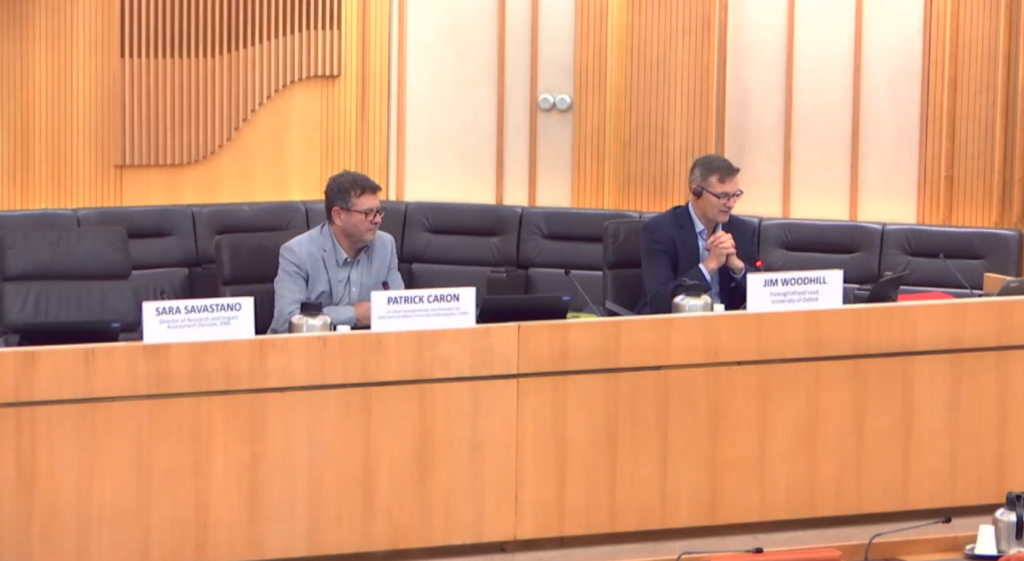
Abdurazak Ibrahim, Cluster Lead, Institutional Capacity and Future Scenarios, Forum for Agricultural Research in Africa (FARA) introduced the work of the African Foresight Academy in institutional capacity building for foresight and scenarios. He outlined the objectives of Academy and introduced current initiatives. This includes running an AgMOOC on foresight for which 300 people have enrolled and which has been produced in partnership with Foresight4Food.
Akiko Suwa-Eisenmann, a member of the HLPE-FSN, discussed the most recently presented HLPE-FSN report no. 17 on “Data collection and analysis tools for food security and nutrition” which focuses on enhancing data for effective, inclusive and evidence-informed decision making. Akiko emphasised that the current food crisis further illustrates that it is critical to have reliable and up-to-date data on food and nutrition security. Challenges to be faced include enhancing data literacy, dealing with the complexity of food systems across scales, filling critical data gaps, and synthesising and presenting data so it is useful for decision making. Akiko noted that “foresight needs to be data informed and that means not only data collection and analysis but also translating data into insights, and dissemination for making decisions, and that foresight is key in these processes of bringing data to the public debate”. She also highlighted the value of linking the work of the HLPE and that of Foresight4Food.
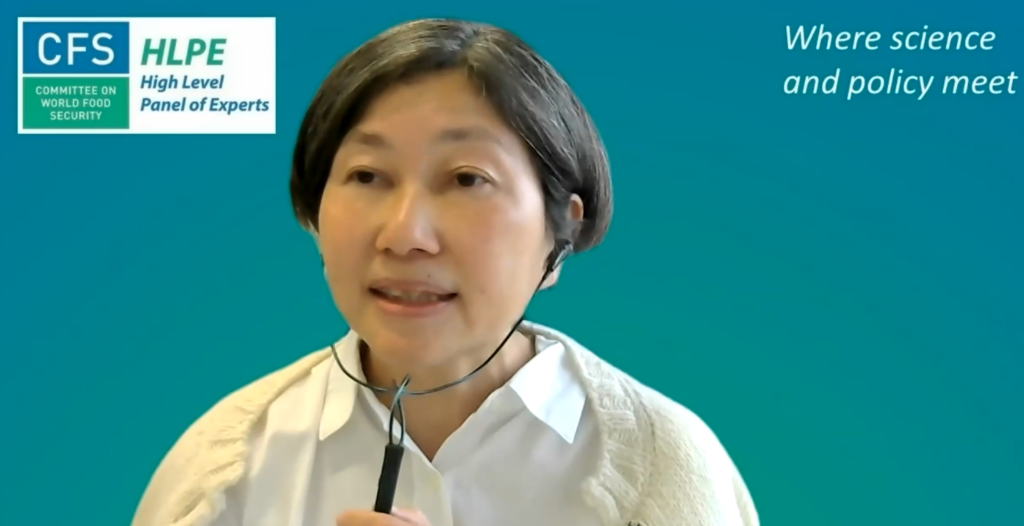
John Ingram, Lead of the Food Group at the Environmental Change Institute, and Associate Professor and Senior Research Fellow at Somerville College, University of Oxford, introduced and launched the new Foresight for Food System Transformation (FoSTr) Programme. This will be a three-year initiative helping to take forward the work of Foresight4Food with engagement in five focus countries across Africa, Asia and the Middle East. FoSTr is funded by the Government of the Netherlands, as a grant through the International Fund for Agricultural Development (IFAD). He talked about the collaborative nature of this work at both national and global levels and its intention to support a growing community of practice across foresight providers and users.
Read Also: Successful launch of the FoSTr Programme in Jordan during fruitful roundtable on future food systems
Sara Savastano, the Director of IFAD’s Research and Impact Assessment Division, discussed the need to understand how food systems work in the selected countries where FoSTr will operate. She noted the importance of foresight as a key contributor for designing effective investment projects which tackle the longer-term challenges of building resilience into food systems.
Ravi Khetarpal, Executive Secretary of Asia Pacific Association of Agricultural Research Institutions (APAARI), and Chair of the Global Forum for Agricultural Research (GFAR) underlined the continued importance of the agri-food sector for security and development across the Asia Pacific. He emphasised the critical need for multi-stakeholder platforms at national and local levels to help drive the needed innovation for transforming food systems. He saw foresight and the Foresight4Food initiative as a valuable contribution to such processes and welcomed its work in the region. To achieve sustainable and resilience food systems he called for more evidence-based policy making, which relies on good data and the type of integrated qualitative and quantitative analysis which can be offered by foresight.
Sara Mbago-Bhunu, the Director of IFAD’s East and Southern Africa Division, highlighted the current crises across the region being driven by increasing energy and food prices, along with climate impacts. She welcomed the FoSTr initiative and noted the critical need to transform food systems for long-term resilience while also tackling the humanitarian relief demands in the short-term. She emphasised the historical link between high food prices and social unrest and reminded the audience of the huge shortfall in investment funds for the agri-food sector. She hoped that “the FoSTr program as you have described here can do the modelling and forecasting to build up capacities in this space for informed policy making to invest in sustainable and circular management [of food systems]”.
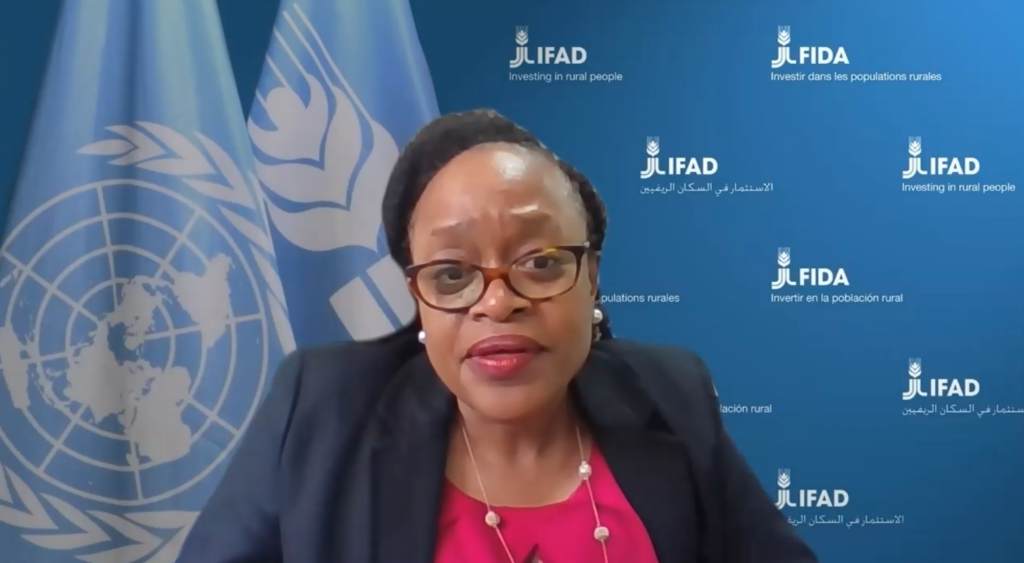
Winnie Yegon, a Horticulture Fellow with the African Food Fellowship, and food systems expert with the Food and Agriculture Organisation (FAO) explained how training in food system foresight provided by the Followship Programme, has enabled new perspectives on how to bring about change in food systems. In particular, she noted the value of an integrating perspectives that brings stakeholders together to make sense of available data.
Herman Brouwer, Senior Advisor for Multi-Stakeholder Collaboration at the Centre for Development Innovation (CDI), Wageningen University and Research, highlighted two key implications from the discussion, on one hand the need for reliable data and on the other the need for processes which enable collective sense making. He noted that helping to bring enhanced literacy on data and foresight processes is a valuable contribution which can be made by Foresight4Food and the FoSTr Programme. In particular, he emphasised the need for collaboration between different stakeholder across the food system to enable change, and that foresight can make a valuable contribution to such collaborative processes by creating shared understanding of future risks and opportunities.
Key Messages
- The current crisis in energy and food prices underscores the need for food systems transformation with a central focus on resilience.
- Transforming food systems requires long-term perspectives and futures thinking which can be supported through foresight and scenario analysis.
- Foresight is most valuable when it can integrate qualitative and quantitative methods and engage stakeholders from across the food system.
- Foresight4Food offers a network and platform for sharing experience and methodology on foresight for food systems change, and for supporting capacity development.
- Foresight needs good data on food security and nutrition, however, there remain large gaps in data availability and limited literacy on how to collect and analyse data.
- The Foresight for Food System Transformation (FoSTr) Programme will provide three years of support for the work of Foresight4Food and enable in-depth work in five focus countries.
- Enhancing food systems and foresight literacy across key players in food systems is increasingly recognised as an important element in being able to transform food systems and take forward national food systems transformation pathways.